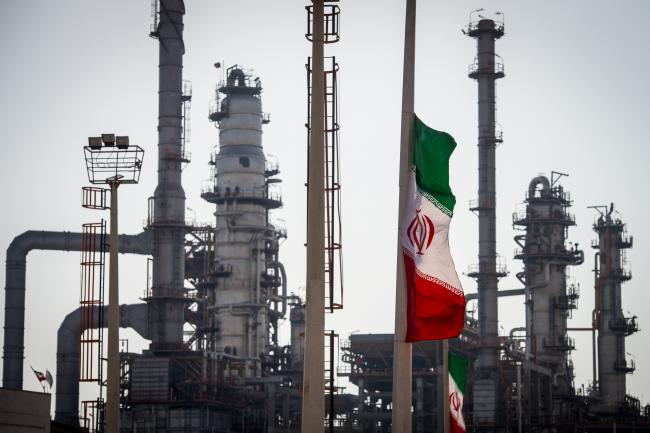(Bloomberg) -- Six months after the U.S. rocked oil markets by letting Iranian exports continue, its decision to end sanctions waivers that allowed shipments is also set to reverberate across the globe.
The U.S. is said to announce Monday morning in Washington that it won’t renew exemptions from its sanctions to buyers of Iranian crude after they expire on May 2. It marks a change in direction from November last year, when the Donald Trump administration granted waivers to eight importers as it sought to temper fuel prices ahead of American mid-term elections.
The move threatens to squeeze supplies further in a market that’s already facing supply disruptions from Venezuela to Libya and Nigeria, and extend this year’s rally in global benchmark Brent crude above $70 a barrel. Prices are still below the four-year highs of over $86 they hit in October before the U.S. issued its waivers.
Here are some of the potential implications of the Trump administration’s latest decision, which is aimed at piling economic pressure on Iran over the Persian Gulf state’s nuclear program by cutting off a key source of the OPEC member’s revenue.
Fate of OPEC+ Deal
The U.S. government will also announce that it got commitments from suppliers such as Saudi Arabia and the United Arab Emirates to offset the loss of Iranian crude, according to people with knowledge of the matter.
That could jeopardize the output deal between the Organization of Petroleum Exporting Countries and its allies, which have been curbing supplies since the start of the year to avert a glut. Russia, one of the partners in the pact, has already signaled that the cuts may not need to be extended. A decision is expected when the producer group known as OPEC+ meets in June.
The pact was driven by Saudi Arabia after it was blindsided last year by the U.S. decision to grant waivers, which sparked a collapse in crude into a bear market in the fourth quarter. Now, the American pledge to eliminate oil exports from Iran may provide an incentive for Crown Prince Mohammed Bin Salman -- a Trump ally -- to ease the kingdom’s policy.
Price Relief?
While crude has jumped more than 3 percent on the news that the U.S. won’t renew exemptions, the future direction of prices may be determined by how much the likes of Saudi Arabia and the U.A.E. are able to cushion the blow amid other supply disruptions.
Last year, prices jumped to over $86 a barrel even though Saudi Arabia was pumping at record levels. Now, it’s not just Iranian shipments that are disrupted. Separate U.S. sanctions on Venezuela have squeezed supplies from that OPEC producer too, while fellow group member Libya is roiled by violence. Just on Sunday, a key oil pipeline in Nigeria was halted after a fire.
Iran’s exports in March totaled about 1.3 million barrels a day, tanker-tracking data compiled by Bloomberg show. Shipments were as high as 2.5 million barrels daily in April last year, before the U.S. announced plans to reimpose sanctions on the Islamic Republic.
Pain for Buyers
The current set of waivers expiring on May 2 allowed China, India, Japan, South Korea, Italy, Greece, Turkey and Taiwan to continue importing Iranian crude without being subjected to retaliatory U.S. sanctions. With the end of the waivers, the buyers face being cut off from the American financial system if they continue purchases.
Of the buyers, Asian nations India, South Korea, China and Japan are likely to be the hardest hit. If crude prices go higher, currencies in import-dependent nations may weaken and inflation could accelerate. The biggest importers had already put purchases from the Persian Gulf state on hold as they waited for the U.S. decision.
South Korea’s Hanwha Total Petrochemical Co. has already been buying and testing alternative cargoes from areas such as Africa and Australia. While it’s not impossible to find other options, that would raise costs and could affect the company’s profits, according to a spokesman.
Even if the Trump administration secures commitments by Saudi Arabia and U.A.E. to make up for lost volumes, South Korean buyers will be hit because the Middle East nations export only limited supplies of condensate -- a form of ultra-light oil used to produce petrochemicals -- according to traders who participate in the market.
Alternative American
Some buyers may find relief in the shape of rising U.S. shale exports. South Korea, for example, buys condensate from Iran, which can potentially be replaced with an alternative from America -- though it would mean higher freight costs owing to a longer shipping journey.
But for others, U.S. shipments may not be the best option. That’s because American shale supply is typically made of “light-sweet” varieties that have a relatively low sulfur content and density. The type of crude that’s being squeezed in the market -- from Venezuela for instance -- are “heavy to medium sour” grades that are more sulfurous and denser.
(Adds details on alternative supplies in 14th paragraph.)
